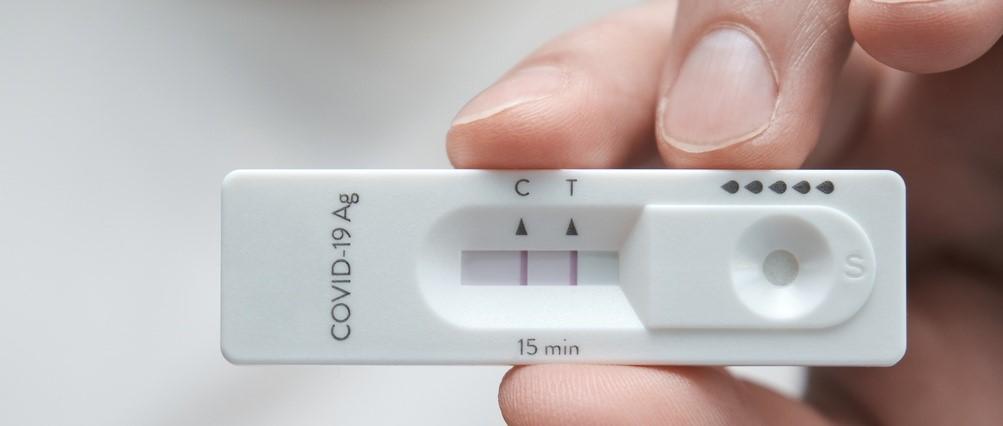
COVID-19 : comment les symptômes d'Omicron se comparent-ils à ceux d'autres variantes ?
Révision par les pairs : Dr Sarah Jarvis MBE, FRCGPDernière mise à jour par Amberley DavisDernière mise à jour : 15 décembre 2021
- TéléchargerTélécharger
- Partager
First identified in South Africa on 24th November 2021, the new COVID-19 variant known as Omicron has fast become a variant of concern in the UK and worldwide. How do the symptoms of Omicron compare to other COVID-19 variants?
Dans cet article :
Poursuivre la lecture ci-dessous
What COVID-19 variants are there in the UK?
Since it was identified in India in early 2021, the Delta virus variant of coronavirus (COVID-19) has become responsible for most COVID-19 infections worldwide. In the UK, Delta remains the dominant variant with the highest rate of infections. Omicron however, although only discovered in South Africa on 24th November 2021 (and declared a variant of concern by the World Health Organization two days later), appears to have a faster transmission rate.
UK Health Security Agency - Top COVID-19 variants in England
Accurate as of 10th December 2021:
Delta.
Omicron.
Alpha.
Beta.
Gamma.
Omicron prevalence in the UK
Accurate as of 13th December 2021:
4,713 confirmed cases.
The new COVID-19 variant Omicron has a large number of mutations, and has prompted countries around the world to impose travel bans on southern African countries as well as to reintroduce domestic restrictions.
How do Omicron symptoms compare to other variants?
The main symptoms of earlier COVID-19 variants include:
Toux.
A loss of/change to your sense of taste.
Delta, the current dominant variant in the UK, can trigger these symptoms as well as the following:
Un nez qui coule.
As Omicron is such a new COVID-19 variant, experts advise that there are currently not enough data to confirm any new COVID symptoms with any certainty.
With this in mind, there is some early evidence to suggest new COVID variant symptoms. Angelique Coetzee, a South African doctor who has treated patients with Omicron, records fatigue and a high pulse among 'unusual' COVID-19 symptoms. A high temperature, cough, and sore throat were symptoms recognised for other variants and were also reported for Omicron.
Choix des patients pour COVID-19

Poitrine et poumons
Ce que l'on sait des nouvelles variantes du COVID-19, Eris et Pirola
Alors que les blocages appartiennent au passé, le COVID-19 n'est peut-être pas au premier plan des préoccupations de chacun, mais il continue de se propager. Et tant qu'il en sera ainsi, des mutations du virus, souvent appelées "variantes", continueront d'apparaître. Nous examinons ici ce que nous savons des deux nouvelles souches, Eris et Pirola.
par Lydia Smith

Poitrine et poumons
Long COVID
La plupart des personnes atteintes d'une infection à COVID-19 (infection à CoV-2 du SRAS) se sentent mieux au bout de quelques jours ou semaines et se rétablissent complètement dans les 12 semaines suivant l'infection. Cependant, certaines personnes présentent des symptômes qui persistent pendant des semaines, des mois ou plus longtemps, ce qui est généralement appelé "COVID long". Pour certaines personnes, ces effets à long terme de COVID-19 peuvent être débilitants. Ces effets peuvent être très différents d'une personne à l'autre, et il semble probable qu'il existe différents "types" de COVID longue, ou différents syndromes, qui peuvent se comporter de différentes manières.
par le Dr Doug McKechnie, MRCGP
Are Omicron symptoms milder?
According to Professor Rodney E. Rohde, a professor of clinical laboratory science and an infectious disease specialist at Texas State University, "At this time [Dec 8, 2021], the Omicron variant is showing less severity in infected patients."
However, Rohde stresses that there is a lack of data and many influential variables to account for at this early stage: "Experts must allow for time [several weeks or more] to determine if it is more severe an infection compared to other variants.
"We also need to remember that the information coming out of South Africa is not a complete picture, since many of the reports of infection are younger individuals. In other words, we need a larger and more diverse sample set to be sure."
As of 14th December, official figures confirm one death from Omicron. The health secretary Sajid Javid reminded the public that hospitalisations and deaths lag infections by around two weeks.
The World Health Organization (WHO) also emphasises that it is not yet clear whether these new COVID-19 variant symptoms cause more severe disease compared with other variants.
Professor Shabir Madhi of the University of the Witwatersrand in Johannesburg, South Africa, pointed out in an interview with the Global Health Crisis Coordination Centre that the South African experience may be unrepresentative. In Gauteng province, the epicentre of the South African outbreak, up to 72% of the population have had previous COVID-19 infection after three earlier waves of the virus. The resultant immune response may be offering protection against severe illness.
WHO also warns that all COVID-19 variants can cause severe symptoms, illness, or death, especially for the most vulnerable groups.
Does Omicron have higher transmissibility?
"Most of the data are from South Africa and are showing that Omicron has a high degree of transmissibility," says Rohde. "But experts and scientists need more time to determine exactly how infectious it is compared to the Delta variant as well as other variants."
Again, a larger pool of data is needed to determine if Omicron does in fact spread at a faster rate. This said, data are being collected and analysed daily as cases rise in the UK and this picture is quickly forming.
According to the latest UK Health Security Agency (UKHSA) report on 13th December 2021, if Omicron continues to grow at the present rate it is predicted to become the dominant variant in the UK within weeks or possibly days. The UKHSA estimates that over one million people will be infected in the UK by the end of the year.
Poursuivre la lecture ci-dessous
How can the COVID-19 Omicron variant be prevented, diagnosed and treated?
At present, official UK public health advice remains the same for all current COVID-19 variants. The headlines for prevention advice are as follows:
Get vaccinated.
Get your third or booster vaccine dose if you are over 18.
Continue to exercise caution; wear a mask in shops and crowded places, ventilate rooms.
If you have symptoms, take a PCR test and isolate at home until you receive a negative result.
Do PCR tests work for the COVID-19 Omicron variant?
WHO advises that PCR tests continue to detect all COVID-19 infections, including the Omicron variant. However, research is currently underway to determine if this new variant has any impact on other types of tests, including rapid antigen detection tests.
Does vaccination offer protection against the COVID-19 Omicron variant?
Early evidence suggests that Omicron may compromise, but not completely eliminate, immunity protection through vaccination. These initial laboratory studies from South Africa, Germany and Sweden are preliminary and more evidence is needed.
A UK Health Security Agency report suggests that booster vaccination offers up to 75% protection against symptomatic infection with the Omicron variant. It is hoped that protection against more severe infection provided by booster doses will be even higher.
Historique de l'article
Les informations contenues dans cette page ont été évaluées par des cliniciens qualifiés.
15 Dec 2021 | Dernière version
15 déc 2021 | Publié à l'origine

Demandez, partagez, connectez-vous.
Parcourez les discussions, posez des questions et partagez vos expériences sur des centaines de sujets liés à la santé.

Vous ne vous sentez pas bien ?
Évaluez gratuitement vos symptômes en ligne